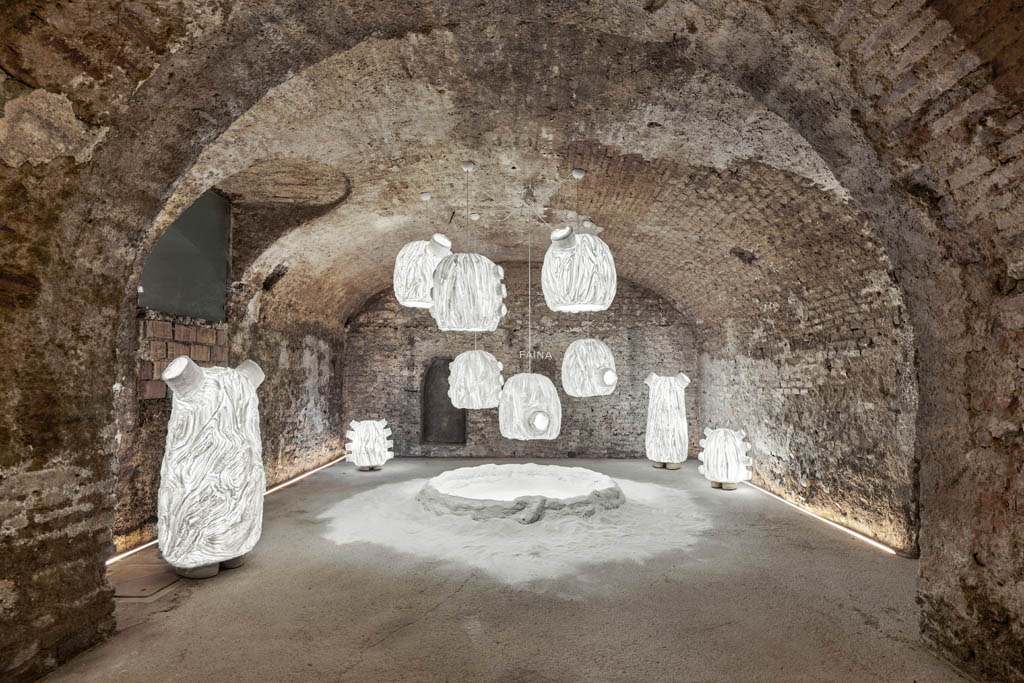
The multifaceted Ukrainian designer, architect and artist brings to Miami her signature fusion of minimalism and emotional connection.
“Live design” is how Victoria Yakusha sums up her creative practice. Asked to explain, she elaborates, passionately: “It is rooted in earth, primal, spirited, it has living energy.” For Yakusha, this “living energy” in an object or a space comes through the craft, natural, traditional materials and archetypal shapes and symbols that continue to live in a new form. “In some ways, ‘live design’ is animistic – it’s a different level of appreciation of and connection with an object or a space,” she adds.
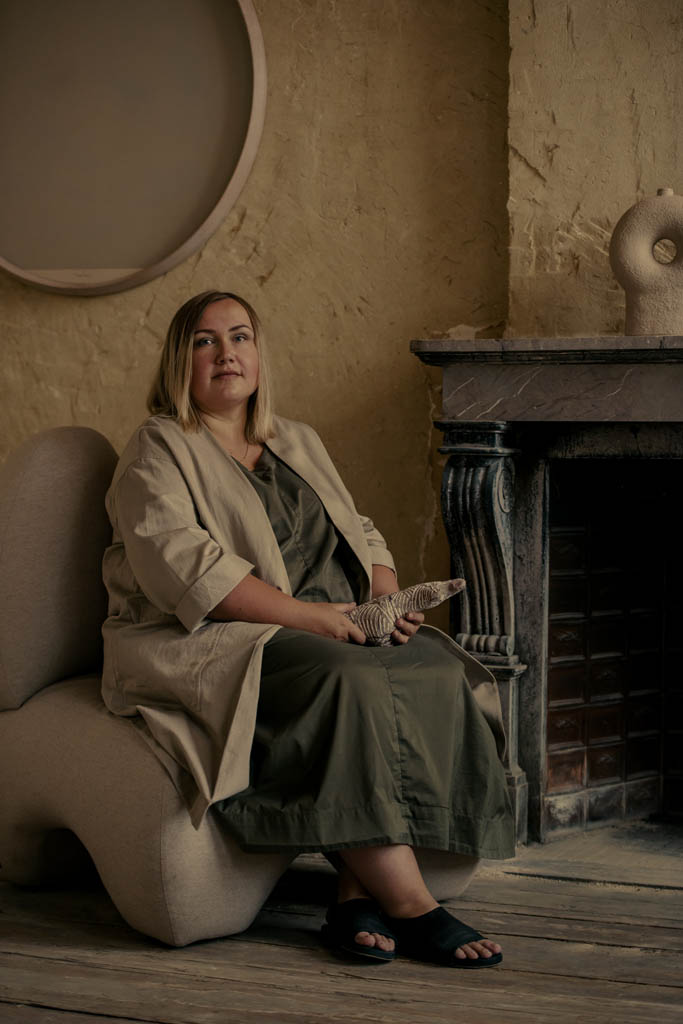
Victoria Yakusha. Photo: Babeth Albert
Yakusha was born in 1982 in Dnipro, Ukraine, and first studied architecture at Prydniprovska State Academy, then honed her skills at Institut National des Sciences Appliquées (INSA) in France. Now living and working between Kyiv, Ukraine, and Antwerp, Belgium, her multifaceted practice spans buildings, interiors, furniture, lighting, and objects—each profoundly imbued with her “live design” philosophy.
Amidst the backdrop of Ukraine’s transformative event, the Revolution of Dignity in 2014, a political upheaval that reshaped the nation’s course, Yakusha embarked on a deeply personal mission. She founded FAINA, a design brand specializing in furniture, decor, and lighting deeply rooted in the rich tapestry of Ukrainian cultural heritage. Through FAINA and her exclusive collections, Yakusha carved her own unique path in the world of design, seamlessly blending a minimalist aesthetic with the intricate cultural codes of her homeland. It was here that her architectural background found a new canvas. “Being an architect first influenced my approach to design and use of materials by giving me a Iaconic vision and a very good feeling of forms and shapes,” she says. Her creations were not just objects; they were a bridge between the past and the present, a dialogue between heritage and modernity. In doing so, she not only elevated her brand but also helped put Ukraine squarely on the global design map.
“In Ukraine, we’re deeply connected to the earth. It’s the foundational element in all my designs,” Yakusha explains, her words carrying the weight of a profound connection to her roots.

ISTETYKA Eatery, Kyiv, Ukraine Photo: Yevhenii Avramenko
From the start, she championed the use of living materials native to Ukraine—clay, wood, wool, and willow vine—all elements that bore the very essence of her homeland. What truly set her work apart, however, were her signature sculptural pieces, brought to life through ZTISTA—a sustainable material of her own invention (the name, which translates from Ukrainian as “of dough,” adds a meaningful touch). This ingenious blend of recycled paper, clay, hay, and other natural elements was more than eco-conscious; it was fully decomposable in soil, embodying her unwavering commitment to creating art in harmony with the environment.
“I see artisans as custodians of invaluable knowledge,” Yakusha reflects, her words echoing her deep respect for tradition and craftsmanship. Her journey was not solitary; it was a collaboration with Ukrainian craftsmen who breathed new life into ancient techniques on the verge of fading into obscurity. In her mission to introduce the world to the rich heritage of Ukrainian arts and crafts, she initiated the “Land Inspires” design expedition to Ukraine in 2018 and 2019. In that year, she was awarded the title of ‘Designer of the Year’ by Elle Decoration Ukraine, winning the Dezeen Awards Public Vote for the best emerging design studio two years later. In 2022, she received the award for Best Curio Presentation at Design Miami Basel for her “Stepping on Ukrainian Soil” installation. The installation featured a two-and-a-half-meter handwoven tapestry symbolizing the deep, unbreakable connection between Ukrainians and the soil of their homeland.
Yakusha’s new collection, “The Land of Light,” marks her debut at Design Miami. This limited-edition seating collection, sculpted from her signature material, delves into the interplay of four mythical creatures, each representing a facet of our inner light. It was a journey into the world of animism—the belief that objects, places, and beings possess a unique living essence.
“I designed ‘The Land of Light’ to be a sanctuary of hope, spiritual luminance, and core values, striving to instill optimism,” says Yakusha. “In our ever-complex world, these characters serve as torchbearers of purity and positivity.”
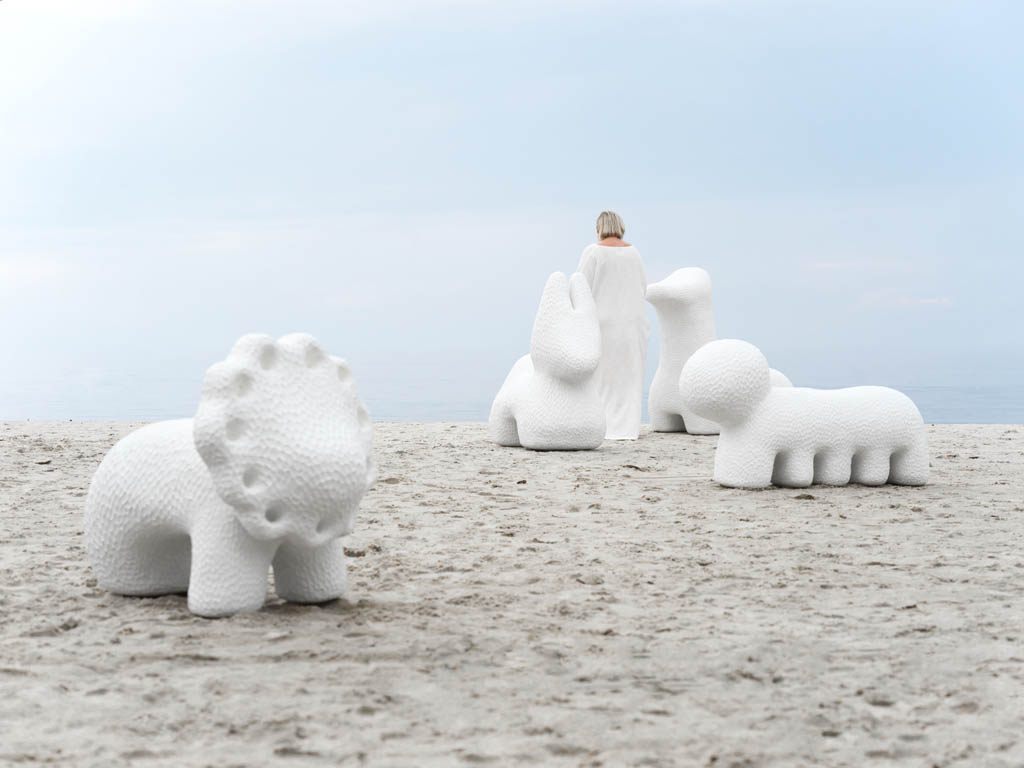
LAND OF LIGHT
Photo: Dima Kutsenko
These mythical characters may bear Ukrainian names that might seem a tad challenging to pronounce at first, but their purposes are remarkably easy to grasp and connect with. Dovhovukh, “The Long-Eared One,” immediately resonates as a vigilant guide; Sontsehryv, “The Sun-Warming One,” effortlessly evokes feelings of joy and clarity; Shvydkonih, “The Quick-Legged One,” embodies the essence of agility and swift reactions; and Neboshuj, “The Sky-Sewing One,” tantalizingly offers foresight into the future. Evoking a genuine sense of Ukrainian culture, each creation intertwines candor with innocence.
Yakusha’s approach may evoke childlike simplicity, but it is charged with profound, thought-provoking intent. Primitivism here serves as a powerful form of expression, mirroring the purity that the designer seeks to share. The war in Ukraine casts a shadow, but these handcrafted mythical beings emanate a radiant light. For Yakusha, darkness and light don’t exist separately and perhaps one needs to be exposed to darkness to truly comprehend light. “The collection invites you to find and embrace your inner light, promoting its spread,” she says, her words resonating with optimism and resilience.
On the architecture side of her practice, Yakusha is involved in multiple projects in both Ukraine and Belgium. In Antwerp, she recently redesigned the interiors of FAINA Gallery. Housed within the walls of a 500-year-old historic building in the heart of the city, the gallery comprises two distinct rooms showcasing a selection of furniture, decor, lighting, and exclusive designs by Yakusha herself.
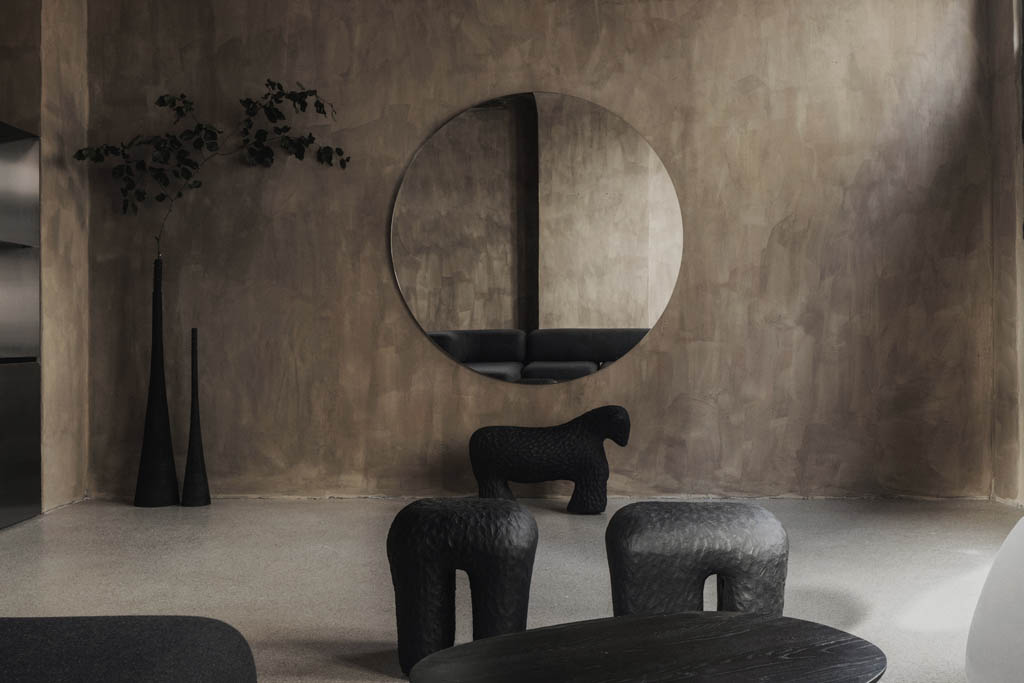
FAINA Gallery, Antwerp, Belgium.
Photo: Tijs Vervecken
A central feature of the interior design was the artful combination of textures. The juxtaposition of the old-world ceiling against the futuristic cabinet, the smoothness of fabric harmoniously coexisting with the textured surfaces of objects. These elements blended seamlessly into a cohesive and captivating whole.
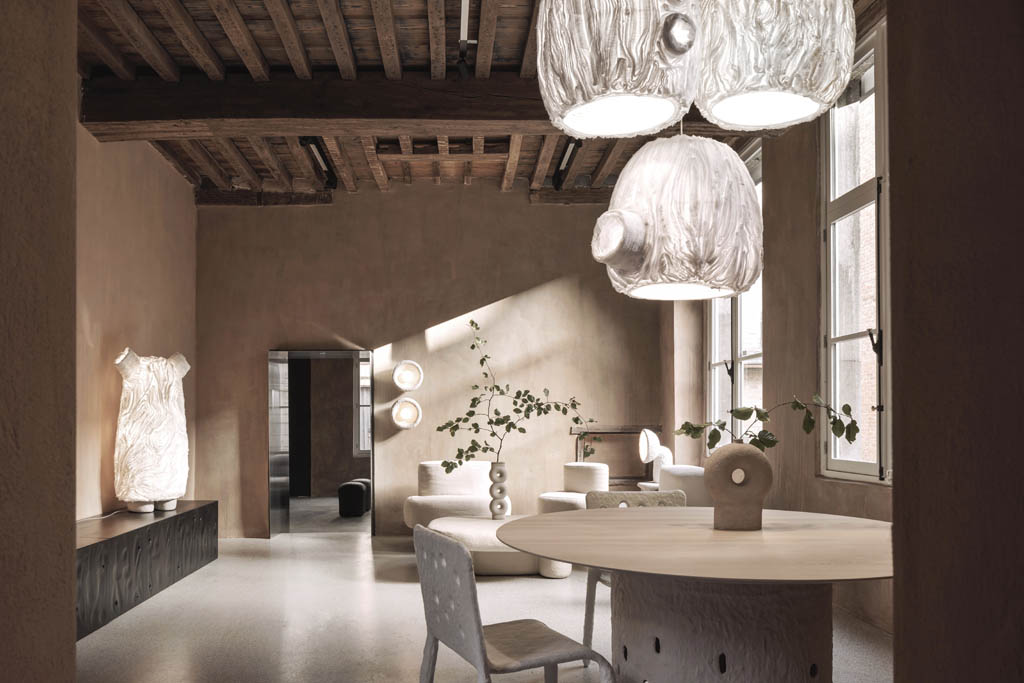
FAINA Gallery, Antwerp, Belgium.
Photo: Tijs Vervecken
“Contrast is one of my favorite design principles,” says Yakusha. “Contrasting scales—large and small, textures—metal and clay, and approaches—modern and historical. It is in the union of these contrasts that I discover true harmony. The space appears as if the objects have always belonged there.”
The project especially close to her heart, however, is a cultural complex in the village of Bolotnya, Ukraine, to house artworks by folk painter Maria Prymachenko. A self-taught artist born to humble means, Prymachenko was an inspiration for Picasso and Chagal, earning fame in her lifetime for her dazzlingly colorful and inventive scenes of animals – lions, cows, horses and birds. Last year a Russian attack hit the Ivankiv Historical and Local History Museum, home to over 20 of Prymachenko’s works, luckily, the majority of them were saved.
“We are collaborating with Maria Prymachenko’s family to preserve her art and build a cultural complex in Bolotnya where the artist spent her life,” says Yakusha.
The architectural complex will include a museum, which will house the saved paintings, embroidery works by the artist, as well as photographs and household items from the foundation’s private collection, which have never been exhibited before. The complex would be formed from a row of 15 conical domes clad in textured, white clay, the structure reminiscent of an animal’s mane – a common motif in Prymachenko’s work. Together with the Maria Prymachenko Family Foundation, Yakusha is helping raise funds with the goal of preserving the artist’s legacy and her contribution to the country’s cultural heritage.
“Maria Prymachenko had a difficult life, but her paintings brought joy. She transformed her pain into joy and gave this joy to people,” Yakusha remarks. “In that regard, she’s a true symbol of Ukraine. Her life and work inspire us to find and nurture our inner light, to endure difficulties with dignity and strive to bring not aggression, but light.” ☐

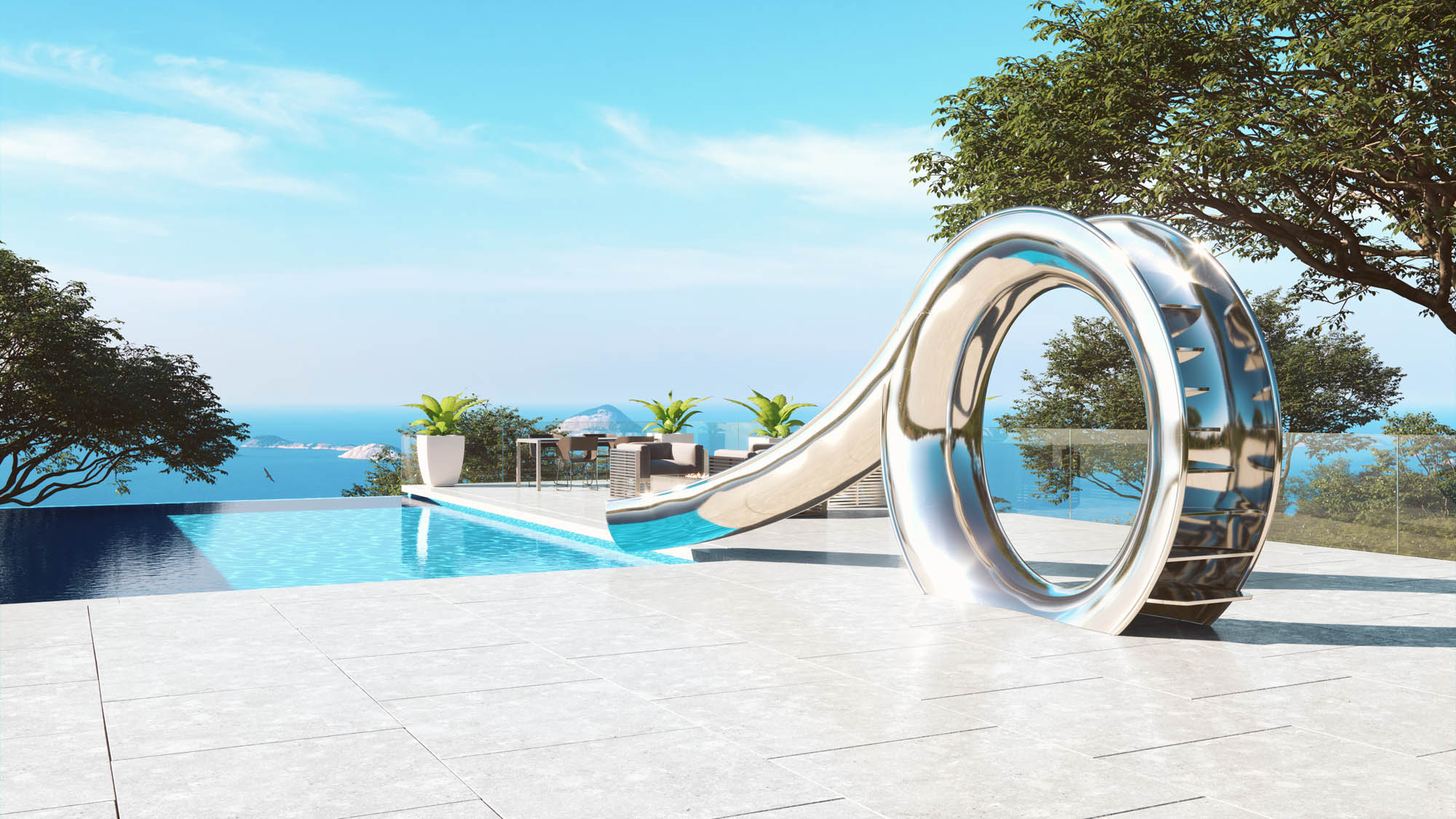
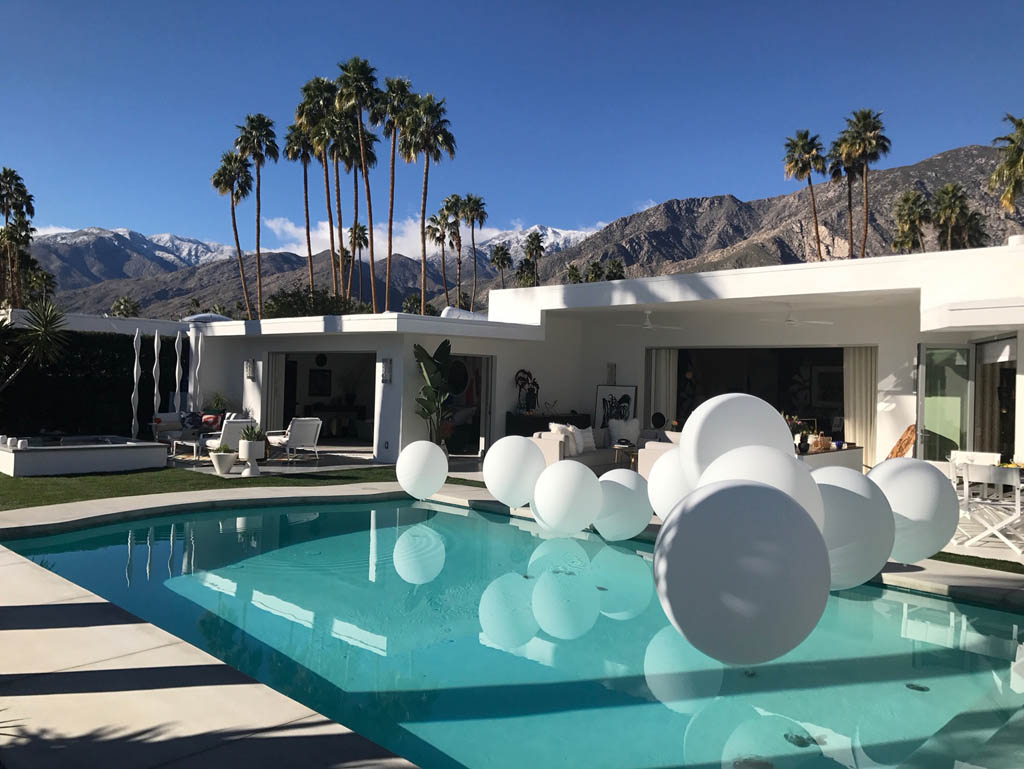
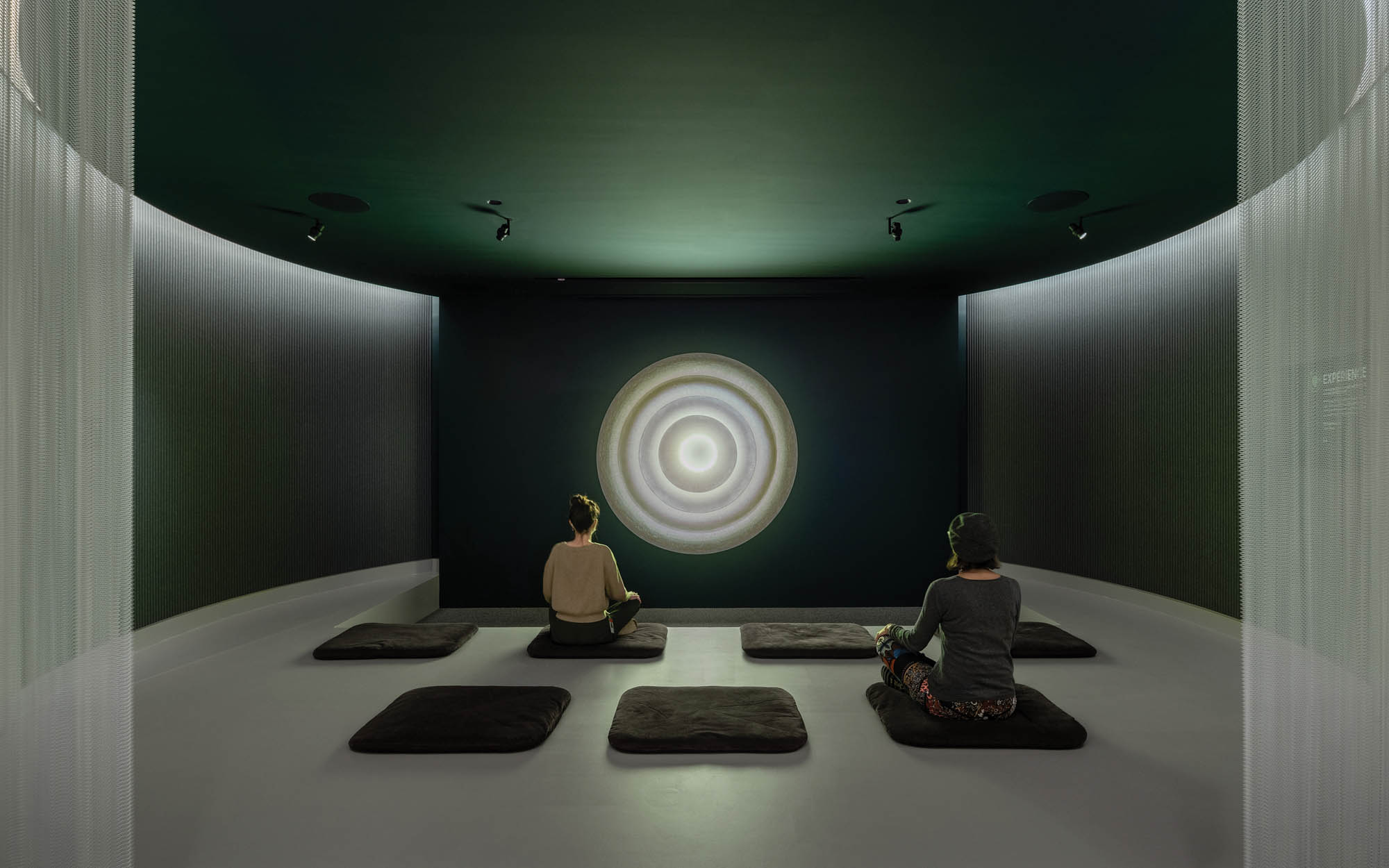
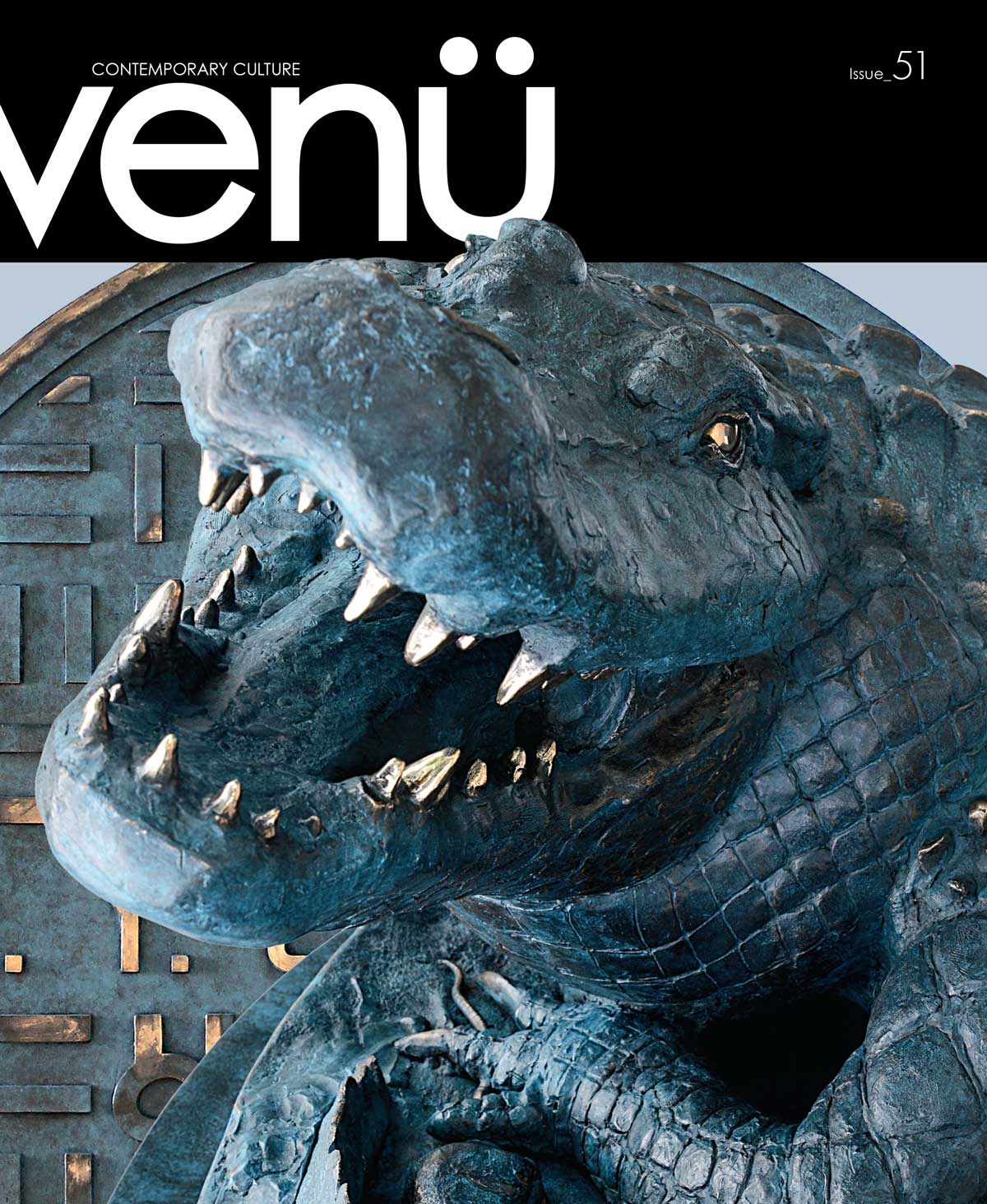
Leave a Reply